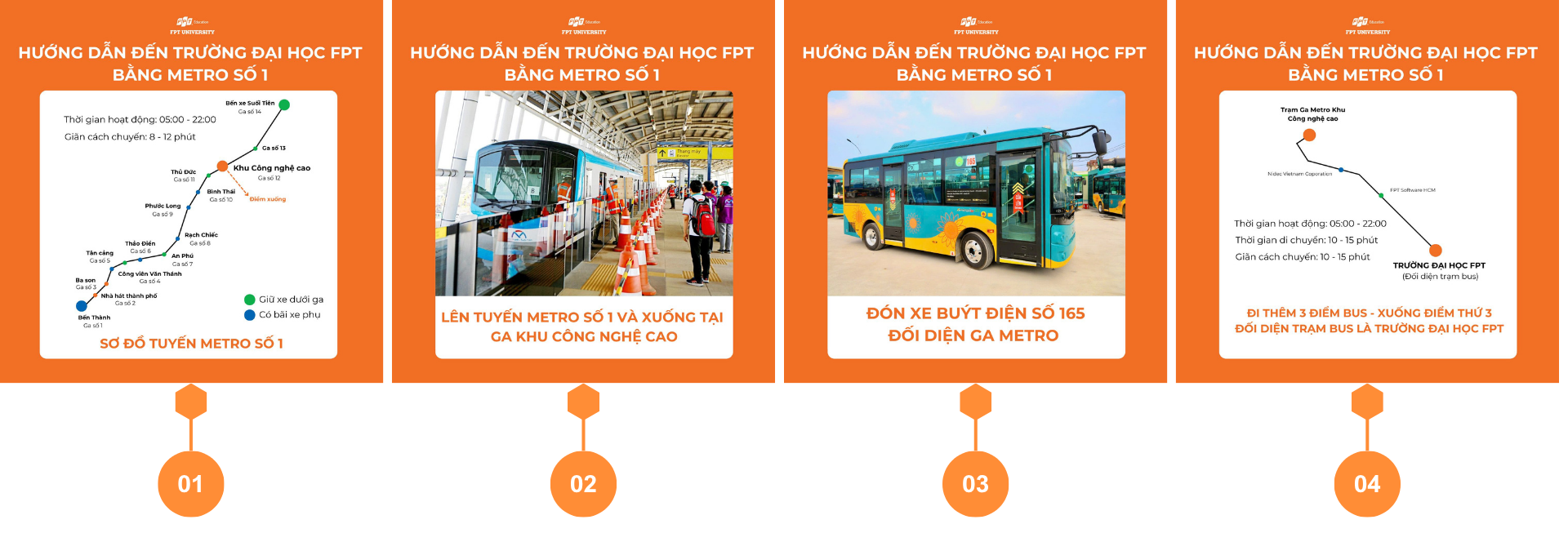1. Establishing a Framework for Sustainable Commuting
FPT University has developed a comprehensive framework to measure, monitor, and enhance sustainable commuting practices across its five campuses — Hanoi, Ho Chi Minh City, Da Nang, Can Tho, and Quy Nhon.
The framework focuses on collecting data on the travel behaviors of students, staff, and faculty; assessing the environmental impact of commuting activities; and setting measurable targets for emission reduction.
Survey on Students’ Commuting Habits
In 2024, FPT University conducted three rounds of surveys on students’ commuting habits. The surveys were designed to:
- Measure and record the modes of transportation used by students to calculate greenhouse gas (GHG) emissions generated from commuting activities.
- Establish emission reduction targets for greenhouse gas emissions from personal commuting in line with the university’s sustainability raodmap.
- Implement communication campaigns and specific action programs aimed at achieving those targets
More than 18,000 students participated in the survey. The results revealed that 80.1% of students commute to campus by personal motorbike, while nearly 20% use public buses or family-shared vehicles.
Assessment of Emissions from Student Commuting
Based on the collected data, the total annual greenhouse gas emissions from student commuting were estimated at approximately 3,300 tCO₂e per year. This measurement provides a quantitative foundation for monitoring future progress and implementing emission reduction initiatives.
Targets for Reducing Emissions from Student Commuting
FPT University has established concrete targets under its Green Transportation Campaign, designed to be implemented over a two-year period:
- Reduce the use of personal vehicles by 20–30%, leading to a corresponding reduction in greenhouse gas emissions from student commuting.
- Achieve, and likely exceed, a 30–35% reduction in personal motorbike use among students by 2027.
These targets are aligned with FPT Corporation’s corporate-wide commitment to reduce total greenhouse gas emissions by 5% before 2030. This demonstrates FPT University’s active role in contributing to the university system’s sustainability goals through measurable, data-driven initiatives.
Commuting Habits of Staff and Faculty
In addition to student data, FPT University conducted a pilot survey on the commuting patterns of staff and faculty members. The results showed that the majority of staff and faculty commute using the university’s shuttle bus system, which operates daily between campuses and major residential areas.
2. Actions Toward Green Mobility
To achieve its sustainable transportation targets, FPT University has implemented a series of coordinated and practical measures:
- Communication Campaigns
Utilizing 28 student clubs, official fan pages, and social media channels, FPT University launched the “Green Transportation” campaign in the Fall 2023 semester to raise awareness and inspire behavioral change among students. The campaign promotes carpooling, public transportation, and especially the use of electric vehicles as key strategies to reduce transport-related emissions. - Shuttle Bus Expansion
The university invested in expanding shuttle bus routes and schedules, connecting campuses with major public transport hubs to facilitate convenient and affordable commuting options. - Coordination with City Transport Authorities
FPT University collaborates with municipal transport departments to open new bus lines and stops near campuses, enhancing accessibility and supporting students’ transition to public transportation. - Partnership with Green Transport Companies
In partnership with SM Green Transport Company, FPT University has expanded electric bus routes and stops serving the campus, student dormitories, and high-density student housing areas — making sustainable mobility more practical and appealing. - Encouraging Metro Use
The university promotes and assists students in purchasing Metro cards, encouraging the use of city rail systems wherever available to reduce reliance on personal motorbikes.
Taking Metro Line 1 to FPT University – a sustainable and convenient route for daily commuting - Support for Nearby Accommodation
FPT University developed a housing information and matching system to help students find rental options close to campus. The “Buddy Ride – Shared Journey” initiative further encourages students living nearby to carpool and reduce individual commuting emissions.
(Items 2–6 are implemented in coordination with partners alongside the Green Transportation communication campaign.) - Recognition and Incentives
The university recognizes and rewards students who actively shift to more sustainable commuting modes. Those who demonstrate measurable reductions in personal vehicle use or actively promote green mobility are publicly acknowledged through student networks and events.
3. Results Achieved
Between Fall 2023 and Fall 2024, FPT University significantly expanded its sustainable transportation infrastructure and achieved measurable results.
- Five additional shuttle bus trips per day were added to enhance accessibility for students and staff.
- The city transport authority launched two new electric bus routes connecting the metro line directly to the university.
- SM Green Transport Company added a new electric bus stop near the campus, improving last-mile connectivity for students.
Thanks to these collaborative efforts — involving the university, municipal transport authorities, and electric vehicle partners — along with the strong Green Transportation Campaign, the percentage of students using personal motorbikes decreased by 20–25% within two years, surpassing the original reduction timeline.

